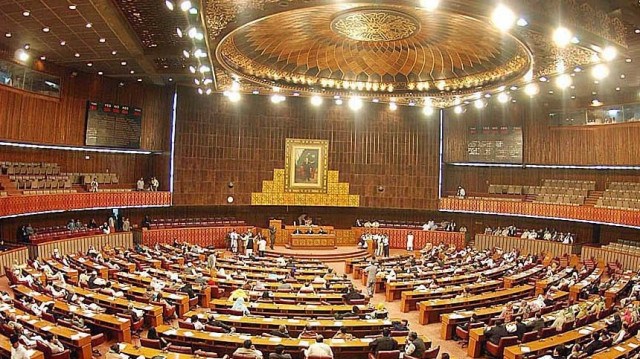Parliament’s accomplishments
It would be erroneous to say National Assembly only treaded water as it made significant legislative accomplishments.

PHOTO: APP/FILE
But it would be erroneous to say that the National Assembly only treaded water. It has many significant legislative accomplishments under its belt, none being more historic than the passage of the Eighteenth Amendment. This was not only the first time that the president had voluntarily given up most of his powers, it was also notable for the National Assembly handing over many of its duties — too many some would say — to the provinces. The Eighteenth Amendment also highlighted the willingness of the ruling PPP to work with its opponents and give way when necessary so that a higher goal could be achieved. Since all the political parties gave their assent to the Eighteenth Amendment and the judiciary, after conducting prolonged hearings and demanding some changes, signed off on it too, this may end up being the longest-lasting legacy of the departing National Assembly.
We also got to see first hand just how vital the reserved seats for women have been in the functioning of the National Assembly. Women on reserved seats were among the most vocal members of parliament and proposed more private members bills than all the other MNAs. This led to some historic legislation on women’s rights issues like domestic violence. Other important bills passed included the setting up of a women’s commission and the Prevention of Anti-Women Practices Act. The passing and successful implementation of the Benazir Income Support Programme should also serve as a blueprint for future parliaments. By making payments to the women of the poorest families in the country, it served as a successful and innovative model for the direction welfare legislation should take.
As successful as this National Assembly has been, there were also many setbacks, mistakes and failures. Even after the assassination of Salmaan Taseer, few parliamentarians, with the notable exception of Sherry Rehman, had the courage to consider reforming the much-abused blasphemy laws. On the power crisis, the National Assembly fell prey to infighting, with the painful but necessary elimination of energy subsidies blocked by the MQM.
Somehow, the National Assembly was able to survive the memogate affair, the Supreme Court’s dismissal of the prime minister, the fake degrees scandal, the ever-present threat of military intervention, the emergence of Imran Khan and the PTI as a significant outside force that was always pressing for early elections and the Tahirul Qadri drama. The PPP was helped in this Herculean endeavour by the PML-N, which served the role of an antagonistic opposition party without ever wanting to derail the democratic project.
The next two to three months will be crucial to cementing the legacy of the National Assembly. All the good work it has done can still be outdone by a caretaker government that is not committed to holding elections or an election commission that ends up being compromised. That this is a remote possibility is to the credit of the current parliament for serving out its term with a sense of mission.
Published in The Express Tribune, March 17th, 2013.



















COMMENTS
Comments are moderated and generally will be posted if they are on-topic and not abusive.
For more information, please see our Comments FAQ